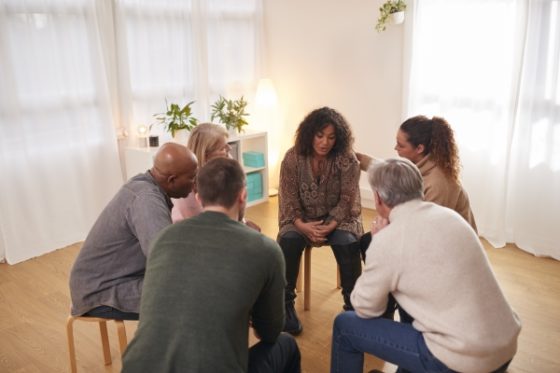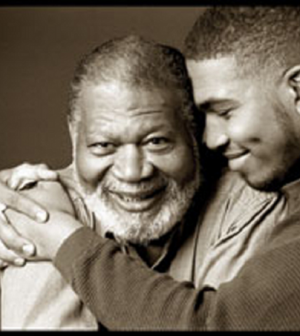I was in the produce section of my local grocery store. I was looking at the bananas and saw a bunch of mainly green bananas. Like a single cloud that hides the sun on an otherwise sunny day, I felt covered by a shadow of sadness.
It’s funny how green bananas can trigger feelings of grief. My 80-year-old mother passed away a few months earlier. Her passing came suddenly and unexpectedly. When I went shopping for her, she always asked me to get the greenest bananas available to last longer. I’m also reminded of my father’s passing less than a year before her passing.
Grief is an overwhelming and challenging emotion to wrestle with. It can arise in situations outside of losing loved ones. You can feel grief after a divorce, over your body, or a change in your life. You may have heard about the five stages of grief. But, many people don’t experience these emotions on a linear level. Grief can be sudden, long-lasting, and devastating.
If you’re experiencing a period of grief, the pain may feel endless. If your loved one is grieving, it can be challenging to know what to say. Grief doesn’t always go away for everyone, and it can feel awkward to watch someone go through it. But, with proper tools and coping mechanisms, you can overcome the most difficult periods of grief. Here are all the things you should know about grief and what to do if you or a loved one experiences intense loss.
Understanding Grief
Grief is your body’s natural response to loss. It can include overwhelming feelings of sadness, anger, or shock. These can be unexpected, affecting your physical health along with your mental wellbeing. You may have a difficult time sleeping, eating, or thinking. These are all normal emotions that many people experience. The more important the loss was to you, the more intense these emotions.
Experiencing intense emotions after the death of a loved one is one of the most common causes of grief. Even so, grief can appear as a result of other significant situations. For example, many people feel very emotional after going through a divorce. Although no one passed away, they still lost an essential part of their life. Their love for their spouse may always be there, but not in the same way.
Some other forms of grief include:
- Job loss
- Life-changing medical diagnoses
- Miscarriage
- Loss of routine after retirement
- Loss of a pet
- Loss of a loved one’s health
- The end of a friendship
- Loss of safety after experiencing trauma
- Loss of a family home
You can even experience grief after graduating from college. There is no right or wrong way to experience these emotions, so never feel ashamed for having them. No matter the loss, it’s personal to you. Even so, there are healthy ways to cope with grief. To move on after experiencing loss, it’s essential to take care of yourself during the process.
Symptoms of Grief
Grief is a very personal experience. There is no right or wrong way to do it, nor is there a specific timetable of when these emotions may occur. Some people feel better after a few weeks, while others may take years to recover. Instead of fighting against the grief, allow yourself to go through the process.
Emotional
Grief can cause you to feel many strong emotions. The most common of these symptoms include sadness. But, you may have other feelings that are more unexpected. You could feel shock, guilt, or fear. Your loss could have been a significant part of your life. The realization of their absence can be a lot to take on. During the grieving process, it’s normal to experience panic attacks, denial, or anger.
Physical
We often associate grief with the five stages. It can be seen as a purely emotional process where the person cries a lot or experiences intense sadness. Although many people have these symptoms, grief can include physical reactions of the body. It’s very typical for a person to experience fatigue, weight changes, or insomnia after a major loss.
Other physical symptoms of grief can include:
- Muscle and/or body aches
- Lowered immunity
- Nausea
Types of Grief
Grief tends to be a very individualized experience. There are no “healthy” or “unhealthy” forms of grief. There are terms to describe feelings associated with certain kinds of loss. Some are more unusual than others, but they’re all typical situations.
Disenfranchised
This refers to a grieving process that is stigmatized, devalued, or invalidated. This can happen when someone has lost something that other people have not openly mourned. For example, a person who recently lost their pet may stifle their feelings of grief.
They may see pet loss as an “invalid” form of grief. Of course, this isn’t true, but it may be something they assume. Similarly, people who experience miscarriages often grieve in silence due to stigmatization concerns. Even so, there is no such thing as unwarranted grief. All grief is valid, and it’s perfectly okay to experience these feelings, no matter the situation.
Complicated
Complicated grief is another word for prolonged emotions associated with loss. Most people learn to live with grief and come to accept their loss. But, some people feel incapable of continuing their life healthily.
This is most common with the death of a loved one. The person may feel like their life can’t go on without their loved one, resulting in mental health problems. They may experience deep depression or suicidal ideation. If you or someone you know feels like this, reach out to another loved one or a mental health professional.
Anticipatory
Anticipatory grief occurs before a loss has happened. This is common in situations where their loved one is diagnosed with a terminal illness. The person may also prepare themselves for their aging loved one nearing the end stages of life. You can still experience stages of grief while processing your emotions. Anticipatory grief can include feelings of anger as a result of feeling hopelessness. But, it can also give the person a chance to prepare for their death and say their final goodbyes.
Stages of Grief
The five stages are some of the most well-known elements of the grieving process. The term was coined by a psychiatrist named Elisabeth Kubler-Ross after researching terminally ill patients. Despite the subject of the study, the five stages of grief have become associated with all forms of loss.
The five stages of grief include anger, depression, denial, bargaining, and acceptance. All these symptoms are typical and common. But, contrary to popular belief, you don’t have to experience all the stages of moving forward. Some people don’t experience any of these feelings. People who experience the stages of grief won’t have them in any specific order.
There is no right or wrong way to experience grief, and it will always be a very personal journey for everyone. Grief is not a linear process, and Kubler-Ross never intended the five stages to be a definitive framework on how people should experience it. She created a tool for people to refer to when experiencing these emotions. At the end of the day, grief can be long-lasting and intense for the person experiencing it. It can also be short and non-intrusive.
Coping With Grief
When you’ve experienced immense loss, the grieving process can feel endless. It can be overwhelming and challenging to process. Even so, it’s essential to take care of yourself while experiencing grief. The good news is that there are ways to combat intense emotions. Positive coping mechanisms can alleviate symptoms and help you start the process of moving forward.
Rely on Loved Ones
Never isolate yourself, no matter how sad you feel. Your loved ones will want to be there for you, even if they don’t have all the answers. Accept help and talk to your friends and family about your emotions. They may not understand what you’re going through, but they will be there to help you get through it.
With that said, be aware that some people may react in awkward ways. Loss can inadvertently scare another person outside of the situation. Have an open mind when sharing your feelings with others. They may not always react the way you want them to, but they always mean well.
Attend a Support Group
You may feel very alone during your grieving process. Since it’s such a personal experience, it can feel isolating and difficult to talk about. But, talking to a group of people going through similar experiences may help you feel less alone. It can also feel good to talk about your feelings in a judgment-free environment.
Talk to a Mental Health Professional
If you’ve been experiencing mental health changes because of your grief, consider seeking professional help. There may be a lot of emotions that you need to talk about in a neutral, judgment-free environment. A licensed counselor can also give you other coping strategies to help you get through your grieving period. Never hesitate to ask for help, especially if you need a safe space to talk.
Helping Grieving Loved Ones
When someone you love is grieving, it can be challenging to know what to say or do. You may be worried about saying the right thing. Their feelings of isolation and loneliness may also make you feel like your input won’t help. It’s understandable to feel like your presence won’t make your loved one feel better, especially when experiencing intense emotions. Even so, don’t let these thoughts keep you from reaching out to a grieving loved one.
Your job is not to say or do all the right things. On the contrary, your loved one needs you more than ever. You may not have all the answers they need, and that’s okay. Sometimes, being there is all the support they need. They may not show it, but your presence will be very appreciated. It’s your support that will help them begin the process of healing from their loss.
Be Empathetic
You won’t understand what your loved one is going through, and that’s just a fact. But, what you can do is listen. Don’t try to bring your own experiences into the situation. If they tell you that they just want you there to listen to their feelings, that’s what you need to do. Acknowledge what they’re going through is hard and that you’re there to support them through the whole process.
Be Supportive
Express your concern for your loved one’s well-being and let them know that you’re there to help. Don’t be afraid to use the word “died” and have discussions surrounding death and loss. This might make you uncomfortable, but you need to be willing to have these difficult discussions to support your loved one. This will show them that you care.
Offer to Help
Don’t just send a text letting them know you’re there to help. Take the initiative to talk to them in person. Ask them what they want and offer to help if you notice something is needed. For example, if you notice they’re low on groceries, offer to make a run to the store.
Be Ready With What to Say
The most important thing you can do is listen. But, if there comes a time when they feel like engaging in a conversation about their loss, use open-ended conversation starters.
- “Do you want to talk about it?”
- “I heard this happened to you….”
- “I’m sorry to hear that this happened….”
- “How are you feeling about this?”
- “I don’t know what to say, but I want you to know that I care.”
- “How can I support you?”
Watch for Warning Signs
It’s normal for there to be periods of intense emotions for your grieving loved one. But, if this lasts a long time or worsens, it may be starting to affect their mental health. Take mental health seriously by gently encouraging them to see a counselor or attend a support group. Offer to go with them if they’re uncomfortable.
Here are a few ways on how to live with the grief when a loved one has passed away, and how to make each day a little easier to bear.








